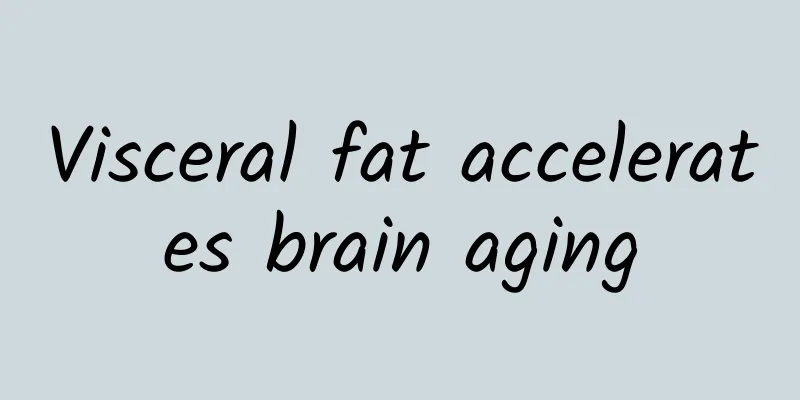Visceral fat accelerates brain aging

|
Expert interviewed: Sun Dejin, chief physician of the Department of Neurology and General Medicine, Shenzhen Third People's Hospital As the saying goes, "being fat can lead to many diseases." Previous studies have mostly focused on the relationship between obesity and metabolic diseases such as the "three highs," ignoring the risk of cognitive decline. Recently, a paper published in The Lancet not only pointed out that excessive obesity is a key risk factor for cognitive decline, but also gave a quantitative standard for obesity to damage the brain, that is, for every 0.27 kg increase in visceral fat, cognitive age will be 0.7 years older. Obesity accelerates brain aging Data from the World Health Organization show that the number of obese people in the world has almost tripled since 1975; by 2030, it is estimated that there will be 78 million people with dementia worldwide, and this number will reach 139 million in 2050. In order to find the factors affecting cognitive function, researchers from Nanyang Technological University in Singapore collected data from 8,769 participants aged 30 to 84 (average age 51.4 years old) and found that a decrease in high-density lipoprotein cholesterol (commonly known as "good cholesterol"), an increase in visceral fat, and an increase in waist-to-hip ratio are associated with lower cognitive function (including memory, attention, execution, and processing speed). In order to more clearly understand the connection between body fat and cognitive function, the researchers conducted a genetic study with a larger sample (also known as a genome-wide association study). The results showed that in Asian populations, increased visceral fat, body mass index [BMI: weight (kg) divided by height (m) squared], and waist-to-hip ratio are risk factors for decreased cognitive function. Among them, the association between increased visceral fat and cognitive decline is the strongest: for every 0.27 kg increase in visceral fat, cognitive age is 0.7 years older. At the same time, the study also found that higher blood pressure, triglyceride or blood sugar levels were not significantly associated with cognitive function. A randomized controlled study from Harvard University in the United States provides evidence for the main conclusions of the above study. The researchers conducted an 18-month healthy diet and physical activity intervention on 102 obese people and scanned their brains at the beginning and end of the study. The results showed that with the adjustment of lifestyle, the brain becomes 9 months younger for every 1% weight loss. In addition, the reduction of liver fat, liver enzymes, and subcutaneous fat will make the brain younger. Relying on blood vessels as an important medium How do the increase in visceral fat and waist-to-hip ratio and the decrease in high-density lipoprotein cholesterol affect brain function? Sun Dejin, chief physician of the Department of Neurology and General Medicine of Shenzhen Third People's Hospital, believes that the reason why these "two highs and one low" can affect brain function is that they rely on blood vessels, an important medium. "There is a sub-disease in cognitive impairment, called vascular cognitive impairment, which is generally considered to be a syndrome caused by cerebrovascular disease. The clinical manifestations are poor thinking, learning and memory, that is, cognitive decline. As the disease worsens, dementia may also occur." Sun Dejin said that the currently known risk factors for vascular cognitive impairment include cerebral arteriosclerosis, hypertension, diabetes, stroke, coronary heart disease, etc. Arteriosclerosis is caused by the adhesion and accumulation of cholesterol and other substances on the walls of arterial blood vessels, which accumulate over time to form plaques, aggravate the damage to the blood vessel walls, and then affect the blood supply to organs throughout the body. Parameters such as visceral fat, body mass index, waist-to-hip ratio, cholesterol and the blood composition of the human body are closely related to cerebral vascular arteriosclerosis. In other words, if the above indicators are not ideal and cerebral vascular atherosclerosis is induced, it may lead to cognitive decline and develop into dementia in severe cases. Regarding the research conclusion that "the impact of visceral fat is particularly prominent", Sun Dejin explained that visceral fat mainly exists around and inside abdominal organs such as the liver, pancreas, stomach, and intestines. The buttocks have more muscles and fat is not easy to accumulate. The obvious manifestations of excessive visceral fat and increased waist-to-hip ratio are abdominal obesity. "Many important organs of the human body are concentrated in the abdomen, and a large number of blood vessels are also distributed here. Increased fat not only easily leads to the occurrence of atherosclerosis, but also compresses the space of blood vessels and organs, affecting blood supply to the brain. Over time, cognitive function will decline." Therefore, compared with uniform obesity throughout the body, obesity in the abdomen has a greater risk of causing brain aging. In addition, body mass index is an indirect indicator for assessing obesity, while high-density lipoprotein cholesterol is a protective factor for cardiovascular and cerebrovascular diseases. The increase in indirect indicators and the decrease in protective factors will naturally increase the risk of cerebrovascular damage, thereby affecting brain function. The above-mentioned Singapore study also found that there is no direct correlation between blood pressure, triglycerides, and blood sugar and cognitive function. This is different from the results of many large-sample prospective epidemiological surveys in the world. In recent years, many authoritative studies have shown that people with high blood pressure are more likely to have atherosclerosis in cerebral arterioles, so hypertension is more likely to damage cognitive function; diabetes, hyperlipidemia, etc. are also clear risk factors for cerebral atherosclerosis. Sun Dejin analyzed: "The currently globally recognized authoritative view is that hypertension, hyperlipidemia, and hyperglycemia are independent risk factors for cerebral atherosclerosis, and cerebral atherosclerosis is closely related to vascular cognitive impairment. Therefore, blood pressure, blood lipids, and blood sugar have a certain impact on cognitive performance." He believes that this study in Singapore provides an important reference for preventing and controlling obesity and protecting cognitive function, and has its research value, but due to the insufficient sample size, the deviation of the inclusion population standard and the insufficient time span, the research results may have certain differences. Sudden weight loss can also damage your brain Generally speaking, a significant decline in cognitive function is more common in old age, but the phenomenon of "obesity accelerating brain aging" does not seem to be exclusive to the elderly. Studies have shown that for people aged 60 to 70, obesity is not associated with a decline in cognitive function. Another long-term longitudinal epidemiological survey showed that weight loss in old age can increase the risk of cognitive impairment. Sun Dejin believes: "Middle-aged obesity increases the risk of cognitive decline, but in old age, if you are underweight or experience unexplained weight loss, the risk of dementia is higher." Clinically, elderly people who are prone to anxiety and depression, or those who are malnourished or anemic due to underlying diseases, are usually prone to weight loss and forgetfulness. Sudden weight loss is a clinical manifestation of Alzheimer's disease. Therefore, it is very important for the elderly to maintain a proper weight. How to prevent "obesity promotes brain aging"? For overobese elderly people, if they want to lose weight scientifically, they should ensure a balanced diet, exercise moderately, and correct bad living habits, which is what we often say "control your mouth and move your legs." In terms of diet, we should follow the principle of balance, which is what we often say: eat more whole grains, fresh vegetables and fruits, fish and shrimp, and control the intake of high-fat foods such as animal offal, fatty meat and salt. On this basis, you can supplement with brain-protecting and anti-aging foods rich in polyphenols, such as walnuts and green tea. Ultra-processed foods such as candies have low nutritional value, but are easily addictive and can easily lead to excessive calories, so they should be minimized. In terms of exercise, moderate aerobic exercise can exercise coordination, enhance brain thinking ability, logic ability and spatial conception ability, and help maintain brain vitality. In addition to aerobic exercise, you can also do some intellectual "exercises", such as reading books, crossword puzzles, playing cards, playing mahjong, etc., which help improve logic ability, memory ability and reasoning ability, and are a good comprehensive exercise for the brain. It should be noted that when doing intellectual "exercises", you should not sit for a long time to avoid lower extremity venous thrombosis. In terms of habits, smoking, drinking, staying up late, irregular work and rest schedules, etc. will accelerate brain aging and should be corrected in time. Sun Dejin emphasized that watching TV is the most detrimental leisure activity to brain function. Especially for the elderly, watching TV for a long time is more likely to make the brain inert, passively accept information, have no information output, and reduce thinking, which is not conducive to maintaining brain function. "It is recommended that children accompany the elderly to go outdoors for walks, breathe fresh air, or chat with neighbors. If the elderly insist on watching TV, the children must review the plot and reasoning about the story with the elderly after watching, so that the elderly can use their brains." Sun Dejin suggested. (Life Times reporter Shi Jie) |
<<: How to improve hair loss caused by lack of sleep
>>: Will people who rely on coffee to "extend their lives" be healthier?
Recommend
Color Doppler ultrasound shows the umbilical cord is around the neck
After a girl becomes pregnant, she must follow th...
What are the methods for women to lose weight in the abdomen
We all know that having a good figure is very imp...
Women have stomach pain when squatting down
I believe that many pregnant mothers have deeply ...
Can I breastfeed while lying down?
Babies who grow up drinking breast milk will have...
How to tell if you are pregnant
Pregnancy is something every woman has to go thro...
You don't need to take calcium tablets after a few months of pregnancy
Many people know that pregnant women need to supp...
How to stimulate menstruation when my period is late
Menstruation is a problem that every woman worrie...
Can I detect pregnancy after ten days of amenorrhea?
Nowadays, many people are beginning to worry abou...
Taking emergency contraceptive pills during breastfeeding
Many breastfeeding mothers become careless and ac...
Omdia: iPhone 15 Pro Max tops sales in first half of 2024 with 21.8 million units
Omdia, a world-renowned market analysis organizat...
Anaerobic vaginal infection, these symptoms are most likely to occur
The female vagina is very susceptible to anaerobi...
Breast and armpit pain
If you experience dull pain in your breasts and a...
Can pregnant women eat salted eggs?
The diet of pregnant women needs to be taken seri...
Lumbar spine causes uterine contractions at 29 weeks of pregnancy
As we all know, pregnancy is a special stage and ...
What to do if you have your period while swimming
Normally, you should not go swimming during menst...









